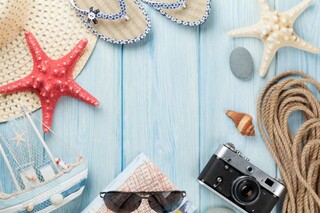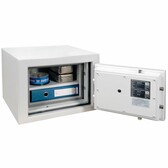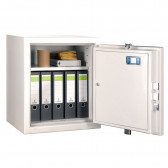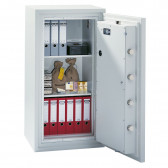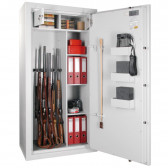With May under our belts, we are moving full steam ahead to travel agencies to look for a holiday destination. Our thoughts are already in the tropics, although instead of Egypt or Turkey, which have recently become less friendly, more and more popular European destinations (Greece, Italy or the beaches of Bulgaria) tempt with their prices and attractions. Personally, I dream of a trip to Spain, following in the footsteps of its centuries-long but greatly underestimated history, magnificent views, monuments, colourful drinks and the Canary Islands.... Well, but to the point.
If, rather than looking for a last-minute holiday, we prefer to get everything sorted out in advance, it would be wise to take the same approach to what we leave at home when we go away. Holidays are holidays, and by turning into tourists we leave a mass of valuables at home or in the flat that need to be kept safe. How do you go about this? Here are a few tips.
Discretion as a lever for security
When you're travelling, go quietly. The temptation to share photos, videos and accounts of the perfect holiday with the world in real time is great, but from a security point of view, the fewer people who know about our absence, the better. Modern burglars carefully prepare every intrusion, and while we are convinced that reporting on social media about our trip plans is nothing sinister, just a sign of the times, if you find yourself in the field of interest of burglars - they will follow you there too.
What's more, the more detailed our accounts of your holiday are, the better for burglars. So, if you share the information that you have taken advantage of the all-inclusive option and will be spending your holiday in an expensive resort, you are making it clear that you are a wealthy person and your home is worth ransacking in your absence. This is one proof that it is better not to have too much, preferring cheap trips or last-minute holidays so that potential amateurs of your possessions do not have time to prepare.
And if you absolutely need to show the world that you have spent your dream holiday in Turkey, Egypt or the Maldives, do it on your return, when it will be too late for a burglary.
Don't let your home be empty
The second aspect is to inform the most trusted person, perhaps several people, of your absence before you fly out. Ideally, when a family member agrees to peek into your home, you will complete by leaving the lights on.
There are interesting solutions in the smart-home category that allow you to remotely programme the switching on of various appliances, such as a television, lamp or music player, at random or predefined times. The effect will be a bit like that of Kevin in 'Home alone', who, with his personal cleverness, tricked burglars into thinking that a party was taking place in an empty house.
The risk of theft will be drastically reduced if there is at least a shadow of a chance that someone is in the house or flat and might find the burglars there.
Home security
Holidays are holidays, but home security is a must. There are several ways to do this, incidentally worth considering all year round, not just during the holidays. In addition to the fairly obvious methods, such as burglar-proof doors and windows, there are the aforementioned smart solutions, which consist of detectors, alarm systems, monitoring and many other devices. You will find a house or flat equipped with such gadgets at most developers, and there are often offers from security companies.
Each of these elements is responsible for a slightly different aspect of security, literally becoming further barriers to burglars. At the very end are safes or strongboxes, designed to protect you from theft when all else fails.
Safe at home
Home safes are devices that are growing in popularity. And rightly so, because the devil never sleeps.
What can you keep in a safe?
If, rather than looking for a last-minute holiday, we prefer to get everything sorted out in advance, it would be wise to take the same approach to what we leave at home when we go away. Holidays are holidays, and by turning into tourists we leave a mass of valuables at home or in the flat that need to be kept safe. How to go about this? Here are a few tips.
You can store many valuable items in a safe to protect them from theft or damage. Here are some examples:
Documents:
• birth certificates,
• passports,
• insurance policies,
• property deeds,
• wills,
• contracts,
• valid bank and tax files.
Valuables:
• jewellery,
• cash,
• gold and silver bars,
• works of art,
• collectibles,
• antiques,
• electronic devices, e.g. laptops and tablets,
• data carriers, e.g. hard disks and memory sticks.
Firearms and ammunition: for the storage of small weapons, almost any safe in class S1 will suffice, while for long weapons there is a separate category of safes with slightly different proportions.
Other items:
• medicines,
• important medical documents,
• items of sentimental value.
Please note that not all items are suitable for storage in a safe. For example, food, beverages and paper products can be damaged by moisture or temperature fluctuations.
Discretion as a lever for security
When you're travelling, go quietly. The temptation to share photos, videos and accounts of the perfect holiday with the world in real time is great, but from a security point of view, the fewer people who know about our absence, the better. Modern burglars carefully prepare every intrusion, and while we are convinced that reporting on social media about our trip plans is nothing sinister, just a sign of the times, if you find yourself in the field of interest of burglars – they will follow you there too.
What's more, the more detailed our accounts of your holiday are, the better for burglars. So, if you share the information that you have taken advantage of the all-inclusive option and will be spending your holiday in an expensive resort, you are making it clear that you are a wealthy person and your home is worth ransacking in your absence. This is one proof that it is better not to have too much, preferring cheap trips or last-minute holidays so that potential amateurs of your possessions do not have time to prepare.
And if you absolutely need to show the world that you have spent your dream holiday in Turkey, Egypt or the Maldives, do it on your return, when it will be too late for a burglary.
Don't let your home be empty
The second aspect is to inform the most trusted person, perhaps several people, of your absence before you fly out. Ideally, when a family member agrees to peek into your home, you will complete this by leaving the lights on.
There are interesting solutions in the smart-home category that allow you to remotely programme the switching on of various appliances, such as a television, lamp or music player, at random or predefined times. The effect will be a bit like that in 'Home alone', where Kevin, with his personal cleverness, tricked burglars into thinking that a party was taking place in an empty house.
The risk of theft will be drastically reduced if there is at least a shadow of a chance that someone is in the house or flat and might find the burglars there.
Home security
Holidays are holidays, but home security is a must. There are several ways to do this, incidentally worth considering all year round, not just during the holidays. In addition to the fairly obvious methods, such as burglar-proof doors and windows, there are the aforementioned smart solutions, which consist of detectors, alarm systems, monitoring and many other devices. You will find a house or flat equipped with such gadgets at most developers, and there are often offers from security companies.
Each of these elements is responsible for a slightly different aspect of security, literally becoming further barriers to burglars. At the very end are safes or strongboxes, designed to protect you from theft when all else fails.
Safe at home
Home safes are devices that are growing in popularity. And rightly so, because the devil never sleeps.
Find out if it's worth buying a safe from a DIY supermarket.
You can store many valuable items in a safe to protect them from theft or damage. Here are some examples:
Documents:
• birth certificates,
• passports,
• insurance policies,
• property deeds,
• wills,
• contracts,
• valid bank and tax files.
Valuables:
• jewellery,
• cash,
• gold and silver bars,
• works of art,
• collectibles,
• antiques,
• electronic devices, e.g. laptops and tablets,
• data carriers, e.g. hard disks and memory sticks.
Firearms and ammunition: for the storage of small weapons, almost any safe in class S1 will suffice, while for long weapons there is a separate category of safes with slightly different proportions.
Other items:
• medicines,
• important medical documents,
• items of sentimental value.
Please note that not all items are suitable for storage in a safe. For example, food, beverages and paper products can be damaged by moisture or temperature fluctuations.
How do you choose a safe?
When choosing a home safe, consider the type of items to be stored, the level of security needed and your budget. Other factors should also be considered: the size of the safe, the way it is mounted (e.g. wall- or floor-mounted) and access to accessories such as interior lighting and shelves.
By the way: here are some tips for storing valuables safely in a home safe:
• Choose a safe of the right size and security level for your needs.
• Place the safe in a secure location in your home or flat, away from windows and doors.
• Secure the safe by anchoring it to the floor or wall to prevent it from being moved.
• Use a strong password or combination for the safe and do not share it with anyone else.
• Change the password or combination regularly.
• Keep backups of important documents such as birth certificates, passports, insurance policies and contracts in the safe.
Summary
Although we try to have quite a large group of safes, especially the simpler and less expensive ones, on hand, there are times when a customer needs something individual. You will find quite a few models in our range, from small furniture safes to large and heavy armoured cash-boxes, available in at least a dozen size variants.
In the same way that you don't book a trip at the last minute, the purchase of safes, especially personalised safes, is worth planning in advance. If you have any questions - give us a call!
